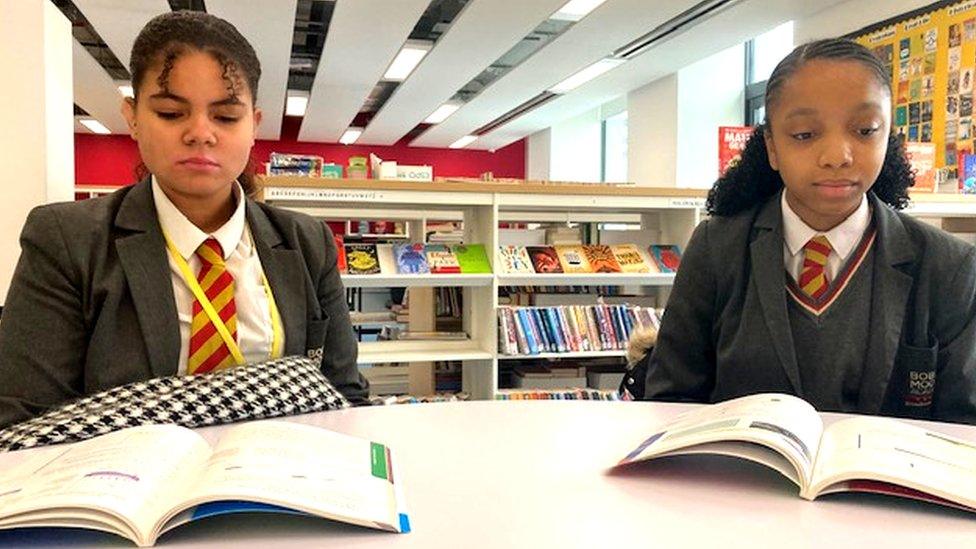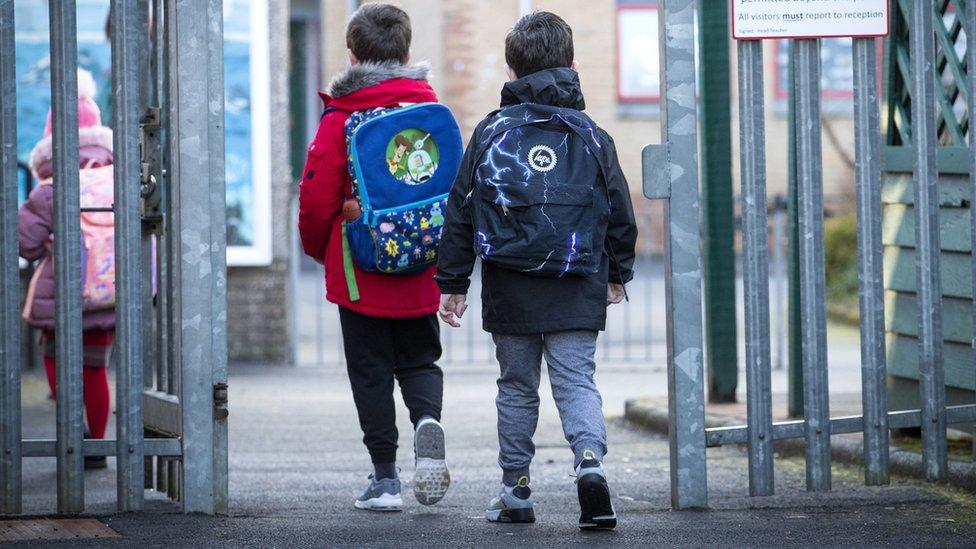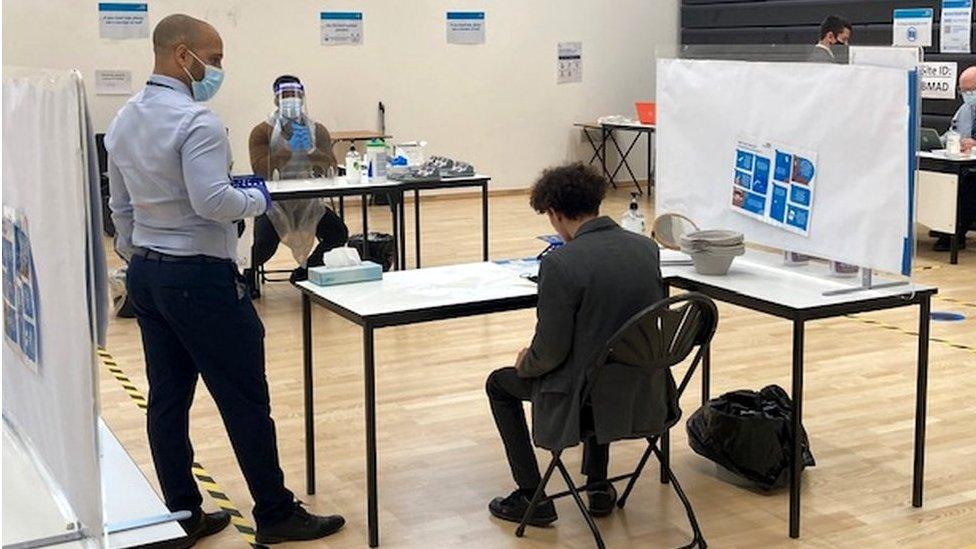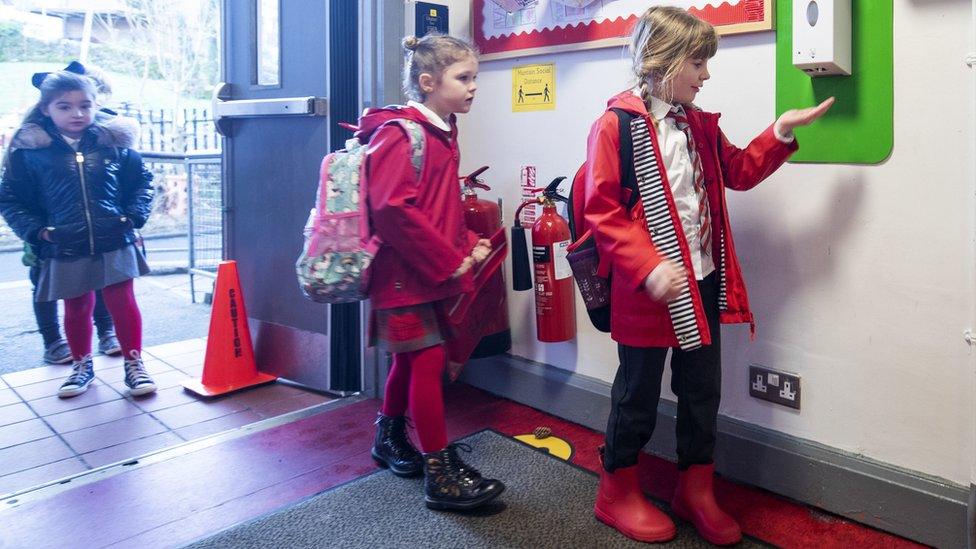Schools back 8 March in England with Covid tests taken at home
- Published
- comments

Secondary school pupils could have two Covid tests a week at home
All schools in England are going back from 8 March, the prime minister has confirmed, with schools able to decide a phased return during that week.
There will be mass Covid testing in secondary schools - with parents expected to carry out the testing at home, after three tests in school.
Home testing for secondary pupils will be twice weekly - but with no testing so far planned for primary pupils.
Face masks will also be required in some secondary school classrooms.
Attendance will be compulsory when schools go back, with penalty fines able to be imposed.

Schools can decide how they stagger the return for different year groups during the first week
"All the evidence shows that schools are safe and the risk posed to children by Covid is vanishingly small," the Prime Minister Boris Johnson told a press conference on Monday evening.
"But to offer even greater reassurance we're introducing twice weekly testing of secondary school and college pupils and asking them to wear face coverings for the rest of this term."
Labour leader Sir Keir Starmer said "the priority must be for all children to be back in school as quickly as possible and to stay in school".
But Geoff Barton, leader of the ASCL head teachers' union, warned getting all pupils back at the same time "runs the risk of increasing the rate of infection and prolonging the damaging cycle of stop-start schooling".
Individual schools can decide on testing arrangements and how year groups go back during the week, but Mr Barton suggested it could need to be staggered over two weeks.
UK chief medical adviser Chris Whitty emphasised his support for the return to school - and that the benefits outweighed any "very small residual risk".
"Everything is strongly in favour of children, whether primary or secondary, going to school - and the data on that I think are unambiguous," he said.
Prof Whitty said there were extra safety measures in place for this reopening - with testing, the greater use of masks and an early "natural fire break" of the Easter holidays.
Testing and masks
After three Covid tests in secondary school and one home test, there will be twice-weekly tests carried out by parents and carers at home.
The tests are voluntary and will operate "based on trust", officials said.

Testing has already been operating in schools open for key worker and vulnerable children
But it remains uncertain how parents will feel about carrying out the lateral flow tests, which are usually swab tests, taking a sample from the back of the throat or from the nose.
Schools will continue to provide some testing facilities for those children whose parents might not be able to carry out testing.
When schools return, face masks will be required in some secondary and further education classrooms, at least for the rest of this term.
The Department for Education said there would be a requirement to "wear face coverings indoors, including classrooms" where social distancing of two metres cannot be maintained.
But the National Deaf Children's Society warned that face masks in the classroom will have a "devastating effect" on deaf children's ability to take part in lessons.
Staff in primary school will be expected to wear face masks in corridors and communal areas "where social distancing between adults is not possible".
Starting date
The return for all schools and colleges will be from the week starting 8 March.
Schools will be able to decide how the return will be organised, with discretion over a phased return for the first week, such as the whether some year groups are brought back earlier.

Young pupils in Scotland have gone back to school
But an alliance of teachers' and head teachers' unions warned that sending back 10 million children and school staff at the same time was "reckless" and risked triggering a fresh wave of infections.
A Sage scientific advisory group meeting from 28 January, with minutes published on Monday, cautioned with "medium confidence" that the "opening of primary and secondary schools is likely to increase effective R by a factor of 1.1 to 1.5 (10% to 50%)"., external
The National Education Union said the reopening plan showed the prime minister, "despite all his words of caution, failed to learn the lessons of his previous mistakes".
Mary Bousted, joint leader of the biggest teachers' union, said: "It remains the case, unfortunately, that cases are three times higher now than when schools re-opened last September."
Catch-up classes
Another £300m has been added to the £1bn catch-up funding announced last year, in recognition of the amount of time pupils will have missed in school.
There will be future announcements on how this is likely to be spent, such as on summer clubs, tutoring, after-school lessons, activities and sports.
A school catch-up tsar, Sir Kevan Collins, has been appointed to lead on this recovery, with particular concerns about the biggest negative impact falling on the most disadvantaged.
Exams
Cancelled GCSEs and A-levels are going to be replaced by teachers' grades, with more details expected on Thursday.
There will be "mini-exams" which are intended to "inform" the judgements made by teachers, rather than be used to decide results.
The mini-exams will be marked by teachers within schools and are likely to be options for schools to use to assess pupils, rather than being compulsory.
Results could be published earlier than usual, allowing more time for appeals ahead of university admissions.
Vocational exams are also expected to use teachers' grades, but with different arrangements for qualifications requiring practical skills.
Schools back in Scotland and Wales
In Scotland, younger primary pupils have gone back to school, along with some exam year students in secondary school. A wider reopening has yet to be decided.
In Wales, younger primary years have also returned on Monday - with older primary pupils set to go back on 15 March if Covid levels continue to fall.
In Northern Ireland, younger primary pupils will return to classrooms on 8 March.
Universities
Face-to-face teaching remained open for university students taking hands-on subjects, such as medicine, while other courses have switched online.
A wider range of these practical subjects will return from March 8. But no date has been decided for when most other courses will return to face-to-face teaching.
The prime minister said a decision would be announced by the end of the Easter holidays, which would be in late April, with students promised at least a week's notice of any return to in-person teaching on campus.
This could hold out the prospect of a return in the summer term. But a number of universities have already announced they will stay online for most courses for the rest of the academic year.